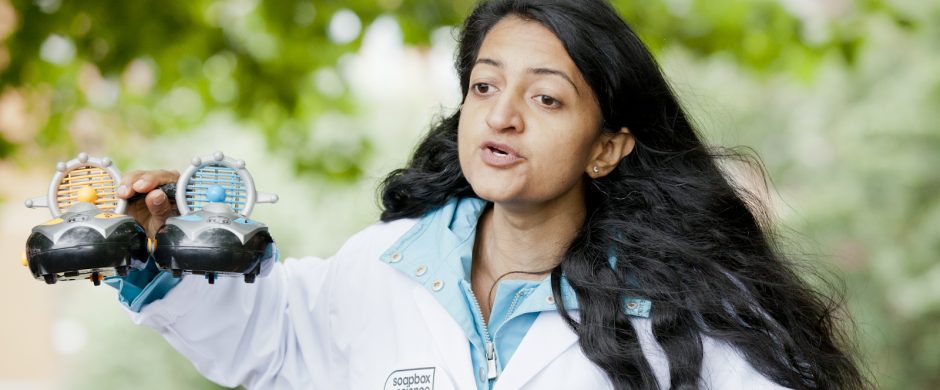 Kirsty Lowe-Brown is a PhD student and the Psychology Technician and Demonstrator at the University of Buckingham. Her research is on children’s understanding of the expression and regulation of emotions. She is taking part in Soapbox Science Milton Keynes on Saturday 29th July 2017.
Kirsty Lowe-Brown is a PhD student and the Psychology Technician and Demonstrator at the University of Buckingham. Her research is on children’s understanding of the expression and regulation of emotions. She is taking part in Soapbox Science Milton Keynes on Saturday 29th July 2017.
SS: Kirsty, how did you get to your current position?
KLB: Initially it was a bit of battle between my two loves of art and science. After I originally applied to study art at university, I then had a change of heart and science won out and I ended up doing a BSc in Psychology at the University of Buckingham. I loved my undergraduate experience and left Buckingham with the intention of applying for Postgraduate courses in Educational Psychology. I sought to gain some experience working with children and so I worked in a primary school and helped run a children’s play scheme organized by an Autism charity. I learnt about the vacancy for my current position at the University of Buckingham and so I decided to follow a research doctoral path instead; but still focusing on my interest in children’s development.
SS: What, or who, inspired you to get a career in science?
KLB: I have loved science as long as I can remember; I think I was a very questioning (annoying) child, always asking “why?” and “how?” My father had a career as an environmental scientist and I’m sure he encouraged my scientific interests. I always thought it was very cool telling my friends my Dad was a scientist, although to be honest, I never really understood what it was that he did.
I became interested in developmental psychology through watching the BBC television series ‘a child of our time’. The series (still ongoing), follows the development of 25 children, born in 2000. The program is presented by Professor Robert Winston, who has, arguably the best moustache in science.
SS: What is the most fascinating aspect of your research?
KLB: Well certainly the thing I enjoy most about research with children is you can never predict what they will come out with. I used interviews in my research studies, which meant I had to spend extensive periods of time sat transcribing my data. If it wasn’t for the often hilarious and very imaginative responses of the children, I’m sure I would’ve gone mad.
The best thing about studying emotions is that they impact all of human experience; this makes affective science (science relating to moods, feelings, and attitudes) a really diverse area for research as you can look at the role of emotions in so many ways.
SS: What attracted you to Soapbox Science in the first place?
KLB: I attended the Milton Keynes event in 2016, when a colleague was a speaker. She was amazing and I thought it was such a fantastic way of engaging the public in scientific research and promoting girl power (I grew up in the 90s, so the spice girls were my heroes).
SS: Sum up in one word your expectations for the day – excitement? fear? thrill? anticipation?
KLB: Nervous. However, as I’m a very anxious person (and as such nervous anticipation is my default state) I try to tell myself that my nervous feelings are really just excitement. This is a strategy called anxiety reappraisal; fingers crossed it will work on the day!
SS: If you could change one thing about the scientific culture right now, what would it be?
KLB: I wish there was less academic snobbery in scientific research. Often at conferences you will hear academics talking down to presenters about their research. I think ultimately everyone is working towards the goal of furthering knowledge and understanding; so the culture should be supportive and focused on encouraging research within each scientific field.
SS: What would be your top recommendation to a female PhD student considering pursuing a career in academia?
Be kind to yourself and try not to compare yourself to others. I think academia inevitably involves a lot of juggling and it can be hard to find the right balance between teaching, research and your home life. I often feel when spending time on one thing that I am neglecting the other aspects, but I think most academics would tell you the same.
